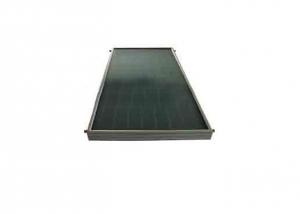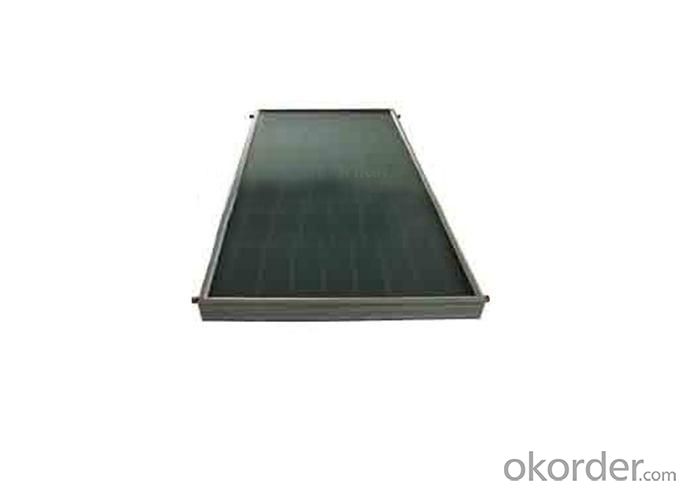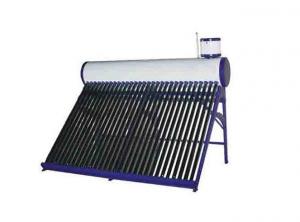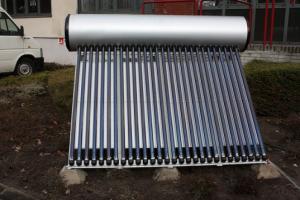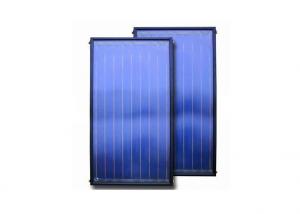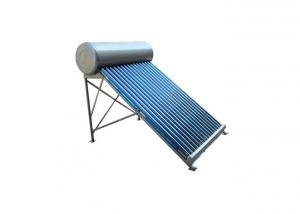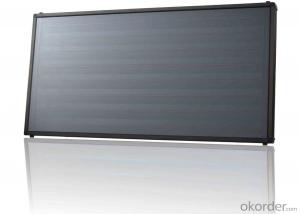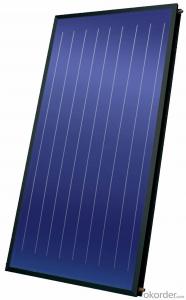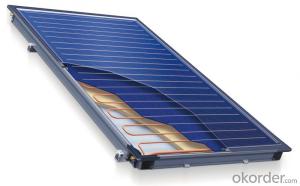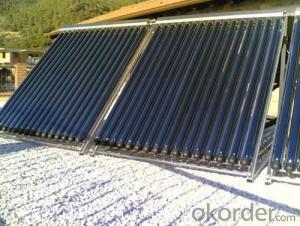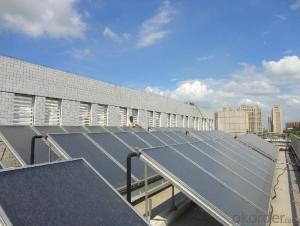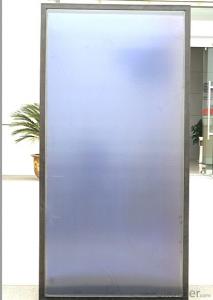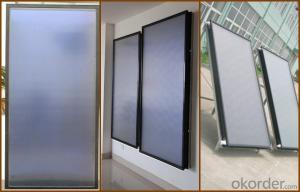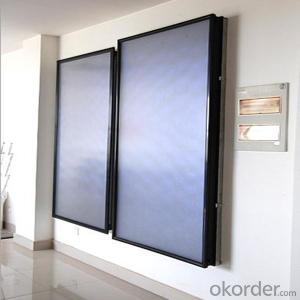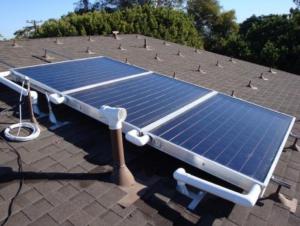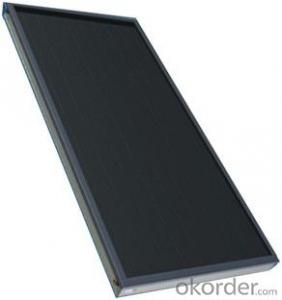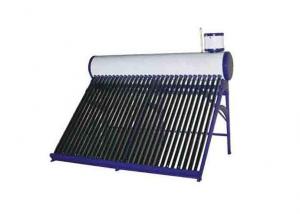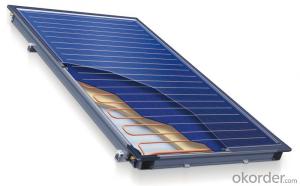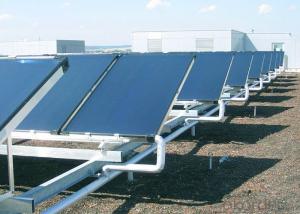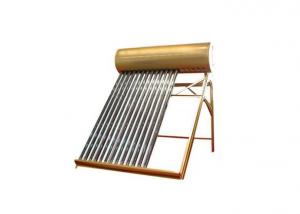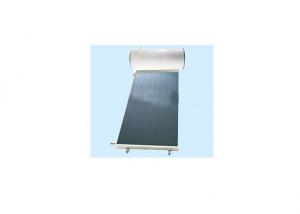High Quality Flat Plate Hydronic Solar Collectors
- Loading Port:
- China Main Port
- Payment Terms:
- TT or LC
- Min Order Qty:
- 1 Piece pc
- Supply Capability:
- 5000 Pieces per Month pc/month
OKorder Service Pledge
OKorder Financial Service
You Might Also Like
flat plate solar collector:
1)high quality
2)the most competitive price
3)best service
Specification of flat plate solar collector:
1)Dimension:2000%*1060*70
2)Gross area: 2 m2
3)Absorb area:1.8 m2
4)Conversion factor:78.5η%
5)Fluit content:2.2L
6)Maxmium operating pressure:1MPA
7)Temperature of operation:35-150 oC
8)Net weighte:32 KG/ PCS
9)Core: all cooper, ultrasonic welding
10)Coating: highly selective titanium coating from Germany
11)Abosorbe material:cooper
12)Header pipe ,material: copper
13)Materila of glass: tempered glass
14)Dimension of glass sheet:1988mm*988mm
15)Material of frame: aluminum alloy
16)Color of frame: champagne/brone-colored/white
17)Insulation : material, high pressure, high density polyrethane foam
18) Thickness of insulation :30mm/40mm/50mm
19)Material and thickness of black sheet:embossed aluminum blacksheet o.3mm
20)Cover sealing material:EPDM+ metal
- Q: Can solar collectors be used for heating power plants?
- Yes, solar collectors can be used for heating power plants. Solar thermal energy can be harnessed by using solar collectors to heat a fluid, such as water or oil, which is then used to generate steam to power turbines in a power plant. This method is called concentrated solar power (CSP) and is a viable renewable energy option for heating power plants.
- Q: Are there any government incentives or rebates for installing solar collectors?
- Yes, there are various government incentives and rebates available for installing solar collectors. These incentives vary by country and region, but they commonly include tax credits, grants, and low-interest loans. Additionally, some utility companies offer programs that provide financial incentives for installing solar collectors, such as net metering or feed-in tariffs. It is advisable to check with local government agencies and utility companies to determine the specific incentives and rebates available in your area.
- Q: Are solar collectors reliable?
- Yes, solar collectors are generally considered to be reliable sources of energy. They have a long lifespan, require minimal maintenance, and have no moving parts, reducing the risk of breakdowns. Additionally, advancements in technology have significantly improved their efficiency and durability. However, like any other system, occasional maintenance or repairs may be required to ensure optimal performance.
- Q: Can solar collectors be used in biomass power plants?
- Yes, solar collectors can be used in biomass power plants. In fact, integrating solar collectors with biomass power plants can enhance the overall efficiency and sustainability of the facility. Solar collectors can be utilized to provide additional heat to the biomass combustion process, thereby increasing the energy output and reducing the reliance on fossil fuels. This integration allows for a more consistent and reliable energy supply, as solar energy can be harnessed even when biomass fuel availability fluctuates. Additionally, the use of solar collectors in biomass power plants can help reduce greenhouse gas emissions and mitigate the environmental impact of the facility. Overall, the combination of solar collectors and biomass power plants can create a more efficient and sustainable energy generation system.
- Q: What is the role of insulation in a solar collector system?
- The role of insulation in a solar collector system is to minimize heat loss and maximize heat gain within the system. Insulation helps trap and retain the solar energy absorbed by the collectors, preventing it from escaping and keeping it available for heating purposes. It also reduces thermal losses to the surroundings, improving the overall efficiency and performance of the system.
- Q: How do solar collectors affect the comfort level of a building?
- Solar collectors can significantly improve the comfort level of a building by reducing the dependence on traditional heating and cooling systems. By harnessing solar energy, they can provide a sustainable and cost-effective source of heat and hot water. This reduces energy costs and ensures a more stable and comfortable indoor temperature throughout the year. Additionally, solar collectors can contribute to a healthier indoor environment by reducing the reliance on fossil fuels and lowering carbon emissions.
- Q: What is the impact of temperature on solar collector efficiency?
- The impact of temperature on solar collector efficiency is significant. As temperature increases, the efficiency of solar collectors tends to decrease. This is due to the fact that as the temperature rises, the heat loss from the collector also increases. Higher temperatures can lead to increased thermal losses, reduced heat transfer, and reduced overall efficiency of the system. Therefore, it is important to consider and manage temperature effects when designing and operating solar collector systems to maximize their efficiency and performance.
- Q: How do solar collectors affect the overall energy efficiency of a building?
- Solar collectors can significantly increase the overall energy efficiency of a building by harnessing the sun's energy and converting it into usable electricity or heat. By generating renewable energy, solar collectors reduce reliance on traditional power sources, thereby reducing the building's carbon footprint and energy costs. Additionally, solar collectors can provide passive heating or cooling, reducing the need for artificial heating or air conditioning. Overall, incorporating solar collectors improves a building's energy efficiency and sustainability.
- Q: Can solar collectors be used for generating electricity on military bases?
- Solar collectors are indeed capable of generating electricity on military bases. Many military bases worldwide have already implemented solar power systems to produce clean and renewable energy. Solar collectors, also referred to as solar panels or photovoltaic (PV) systems, convert sunlight into electricity using the photovoltaic effect. This technology can be easily integrated into military bases, offering a reliable and sustainable power source. There are multiple reasons why solar collectors are well-suited for military bases. Primarily, solar power reduces dependence on traditional fossil fuels, enhancing energy security and reducing vulnerability to supply disruptions. This is especially crucial for military operations that require a constant and uninterrupted power supply. Moreover, solar collectors are cost-effective in the long term. Although the initial installation costs may be higher compared to conventional energy sources, solar power systems have a long lifespan and require minimal maintenance. This makes them financially appealing for military bases operating on limited budgets. Solar collectors also provide environmental benefits. By generating electricity from the sun's energy, military bases can significantly decrease their carbon footprint and contribute to global efforts to combat climate change. Additionally, solar power systems produce no emissions or noise pollution, ensuring a cleaner and quieter environment for military personnel and nearby communities. In terms of practicality, solar collectors can be installed on various surfaces within military bases, including rooftops, parking lots, or open fields. They can also be integrated into existing infrastructure, reducing the need for additional land or space. Additionally, advancements in solar technology have made it possible to generate electricity even in suboptimal weather conditions, ensuring a reliable power supply regardless of the climate. In conclusion, solar collectors are a feasible and advantageous choice for generating electricity on military bases. They provide a sustainable, cost-effective, and environmentally friendly power source, enhancing energy security and reducing reliance on fossil fuels. By embracing solar power, military bases can contribute to a more sustainable future while meeting their operational and energy needs.
- Q: How do solar collectors affect the humidity levels in a building?
- Solar collectors do not directly affect the humidity levels in a building. However, they may indirectly impact humidity by reducing the need for conventional energy sources, such as fossil fuels, which can produce greenhouse gases that contribute to global warming. As a result, solar collectors can help mitigate climate change, which in turn can affect humidity patterns and levels over time.
1. Manufacturer Overview
| Location | Zhejiang,China |
| Year Established | 2005 |
| Annual Output Value | US$2.5 Million - US$5 Million |
| Main Markets | North America South America Eastern Europe Southeast Asia Africa Oceania Mid East Eastern Asia Western Europe Central America Northern Europe Southern Europe Domestic Market |
| Company Certifications | ISO9001:2008;ISO14001:2004 |
2. Manufacturer Certificates
| a) Certification Name | |
| Range | |
| Reference | |
| Validity Period |
3. Manufacturer Capability
| a) Trade Capacity | |
| Nearest Port | Shanghai,Hangzhou |
| Export Percentage | 41% - 50% |
| No.of Employees in Trade Department | 6-10 People |
| Language Spoken: | English, Chinese |
| b) Factory Information | |
| Factory Size: | 5,000-10,000 square meters |
| No. of Production Lines | 5 |
| Contract Manufacturing | OEM Service Offered Design Service Offered Buyer Label Offered |
| Product Price Range | Average |
Send your message to us
High Quality Flat Plate Hydronic Solar Collectors
- Loading Port:
- China Main Port
- Payment Terms:
- TT or LC
- Min Order Qty:
- 1 Piece pc
- Supply Capability:
- 5000 Pieces per Month pc/month
OKorder Service Pledge
OKorder Financial Service
Similar products
Hot products
Hot Searches
Related keywords
